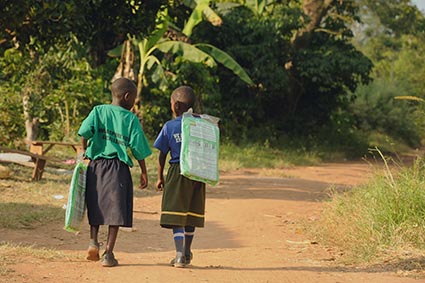My body ached. It felt like I was rolling around in a pit of broken glass. I came home from Ghana with severe chills, headache and a fever. I’d been in Africa two weeks, and these symptoms alarmed me. I recalled seeing the pesky little mosquitoes in my hotel room.
Could I be infected with malaria?
I thought I knew about malaria, but when you think you have it, you really research. For instance, did you know that it’s only the female mosquito that transmits malaria? Not only that, but she bites mostly between 9 p.m. and 5 a.m., which is why we stress the importance of sleeping under mosquito nets.
Two of my American colleagues contracted malaria during trips to Africa.

Carol Ward, Child Survival Program communications supervisor, and Terry Laura, health technical advisor, experienced firsthand that malaria is an equal-opportunity biter. It does not differentiate based on skin color, age or social status.
Their stories remind us, though, that malaria is not an equal-opportunity killer.
Carol recalls her bout with malaria:
“I had the most intense headache and the highest fever I’d ever had. It felt like a horrible case of the flu and kept me in bed for a week.”
Even though the pain was overwhelming, Carol describes what first went through her mind:
“I knew I’d survive, but I kept thinking about our beneficiaries and their families. I could go to the doctor and receive medical care and rest. But they have to endure so much. Many of our beneficiaries do not have ready access to medical care.”
Terry contracted malaria while living in Suna, Kenya — a rural area near Lake Victoria.
“Ironically, Suna means ‘mosquito’ in the local dialect. That should have been my first clue! Foreigners are more susceptible to contracting malaria because our bodies aren’t used to it. Many who live there build up a certain amount of immunity, but it still can be very deadly.”
Malaria, though a much less “glamorous” disease than AIDS, is even more destructive to Africa’s health and welfare. On average, malaria kills a child every 40 seconds; this is more than twice as many lives as claimed by AIDS. Of these deaths, 90 percent are in Sub-Saharan Africa.
Malaria also is the number-one cause of morbidity among beneficiaries in Compassion Africa. Last fiscal year, malaria accounted for 80 percent of beneficiary morbidity in Ghana and 65 percent in Togo. And of all the cases of illness reported in the East Africa region, 39 percent were malaria related.
However, we are doing all we can to fight malaria on behalf of our beneficiaries. Recently, we conducted a study of the effectiveness of our Complementary Interventions in Uganda, Rwanda, Tanzania, and Burkina Faso. We found that in these four countries, 99 percent of Compassion beneficiaries sleep under insecticide-treated mosquito nets (ITNs).

In Uganda, UNICEF reports, 47 percent of households have at least one ITN. Thanks to our ministry, we’re doubling that likelihood for our beneficiaries and their families!
Thankfully, my condition improved after only a few days, most likely simply a case of the flu. Nevertheless, the whole brief experience opened my eyes even wider to malaria.
I praise God that malaria has been eradicated in America and continue to pray that we can play a role in the eradication of malaria across the continent of Africa.







0 Comments |Add a comment